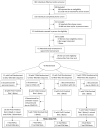Effect of a ketogenic diet versus Mediterranean diet on glycated hemoglobin in individuals with prediabetes and type 2 diabetes mellitus: The interventional Keto-Med randomized crossover trial
- PMID: 35641199
- PMCID: PMC9437985
- DOI: 10.1093/ajcn/nqac154
Effect of a ketogenic diet versus Mediterranean diet on glycated hemoglobin in individuals with prediabetes and type 2 diabetes mellitus: The interventional Keto-Med randomized crossover trial
Erratum in
-
Correction to: Gardner et al. Effect of a ketogenic diet versus Mediterranean diet on glycated hemoglobin in individuals with prediabetes and type 2 diabetes mellitus: The interventional Keto-Med randomized crossover trial.Am J Clin Nutr. 2022 Dec 19;116(6):1904. doi: 10.1093/ajcn/nqac279. Am J Clin Nutr. 2022. PMID: 36349565 Free PMC article. No abstract available.
Abstract
Background: Consensus has not been reached on what constitutes an optimal diet in individuals with prediabetes and type 2 diabetes mellitus (T2DM), especially between low-carbohydrate options.
Objectives: We compared 2 low-carbohydrate diets with 3 key similarities (incorporating nonstarchy vegetables and avoiding added sugars and refined grains) and 3 key differences (incorporating compared with avoiding legumes, fruits, and whole, intact grains) for their effects on glucose control and cardiometabolic risk factors in individuals with prediabetes and T2DM.
Methods: Keto-Med was a randomized, crossover, interventional trial. Forty participants aged ≥18 years with prediabetes or T2DM followed the well-formulated ketogenic diet (WFKD) and the Mediterranean-plus diet (Med-Plus) for 12 weeks each, in random order. The diets shared the 3 key similarities noted above. The Med-Plus incorporated legumes, fruits, and whole, intact grains, while the WFKD avoided them. The primary outcome was the percentage change in glycated hemoglobin (HbA1c) after 12 weeks on each diet. Secondary and exploratory outcomes included percentage changes in body weight, fasting insulin, glucose, and blood lipids; average glucose from continuous glucose monitor (CGM), and nutrient intake.
Results: The primary analysis was of 33 participants with complete data. The HbA1c values did not differ between diets at 12 weeks. Triglycerides decreased more for the WFKD [percentage changes, -16% (SEM, 4%) compared with -5% (SEM, 6%) for the Med-Plus; P = 0.02] and LDL cholesterol was higher for the WFKD [percentage changes, +10% (SEM, 4%) compared with -5% (SEM, 5%) for the Med-Plus; P = 0.01]. Weight decreased 8% (SEM, 1%) compared with 7% (SEM, 1%) and HDL cholesterol increased 11% (SEM, 2%) compared with 7% (SEM, 3%) for the WFKD compared with the Med-Plus, respectively; however, there was a significant interaction of diet × order for both. Participants had lower intakes of fiber and 3 nutrients on the WFKD compared with the Med-Plus. Twelve-week follow-up data suggest the Med-Plus is more sustainable.
Conclusions: HbA1c values were not different between diet phases after 12 weeks, but improved from baseline on both diets, likely due to several shared dietary aspects. The WFKD led to a greater decrease in triglycerides, but also had potential untoward risks from elevated LDL cholesterol and lower nutrient intakes from avoiding legumes, fruits, and whole, intact grains, as well as being less sustainable. This trial was registered at clinicaltrials.gov as NCT03810378.
Keywords: HbA1c; Mediterranean; diabetes; diet; human; intervention; ketogenic; metabolomic; prediabetes.
© The Author(s) 2022. Published by Oxford University Press on behalf of the American Society for Nutrition.
Figures




Comment in
-
Re: Effect of a ketogenic diet versus Mediterranean diet on glycated hemoglobin in individuals with prediabetes and type 2 diabetes mellitus: the interventional Keto-Med randomized crossover trial.Am J Clin Nutr. 2022 Oct 6;116(4):1184. doi: 10.1093/ajcn/nqac202. Am J Clin Nutr. 2022. PMID: 35976052 Free PMC article. No abstract available.
References
-
- Dyson P, Twenefour D, Breen C, Duncan A, Elvin E, Goff Let al. Diabetes UK evidence-based nutrition guidelines for the prevention and management of diabetes. Diabetes Med. 2018;35(5):541–7. - PubMed
-
- Foster GD, Wyatt HR, Hill JO, McGuckin BG, Brill C, Mohammed BSet al. A randomized trial of a low-carbohydrate diet for obesity. N Engl J Med. 2003;348(21):2082–90. - PubMed
-
- Yancy Jr WS, Olsen MK, Guyton JR, Bakst RP, Westman EC. A low-carbohydrate, ketogenic diet versus a low-fat diet to treat obesity and hyperlipidemia: a randomized, controlled trial. Ann Intern Med. 2004;140(10):769–77. - PubMed
-
- Stern L, Iqbal N, Seshadri P, Chicano KL, Daily DA, McGrory Jet al. The effects of low-carbohydrate versus conventional weight loss diets in severely obese adults: one-year follow-up of a randomized trial. Ann Intern Med. 2004;140(10):778–85. - PubMed
Publication types
MeSH terms
Substances
Associated data
Grants and funding
LinkOut - more resources
Full Text Sources
Other Literature Sources
Medical

